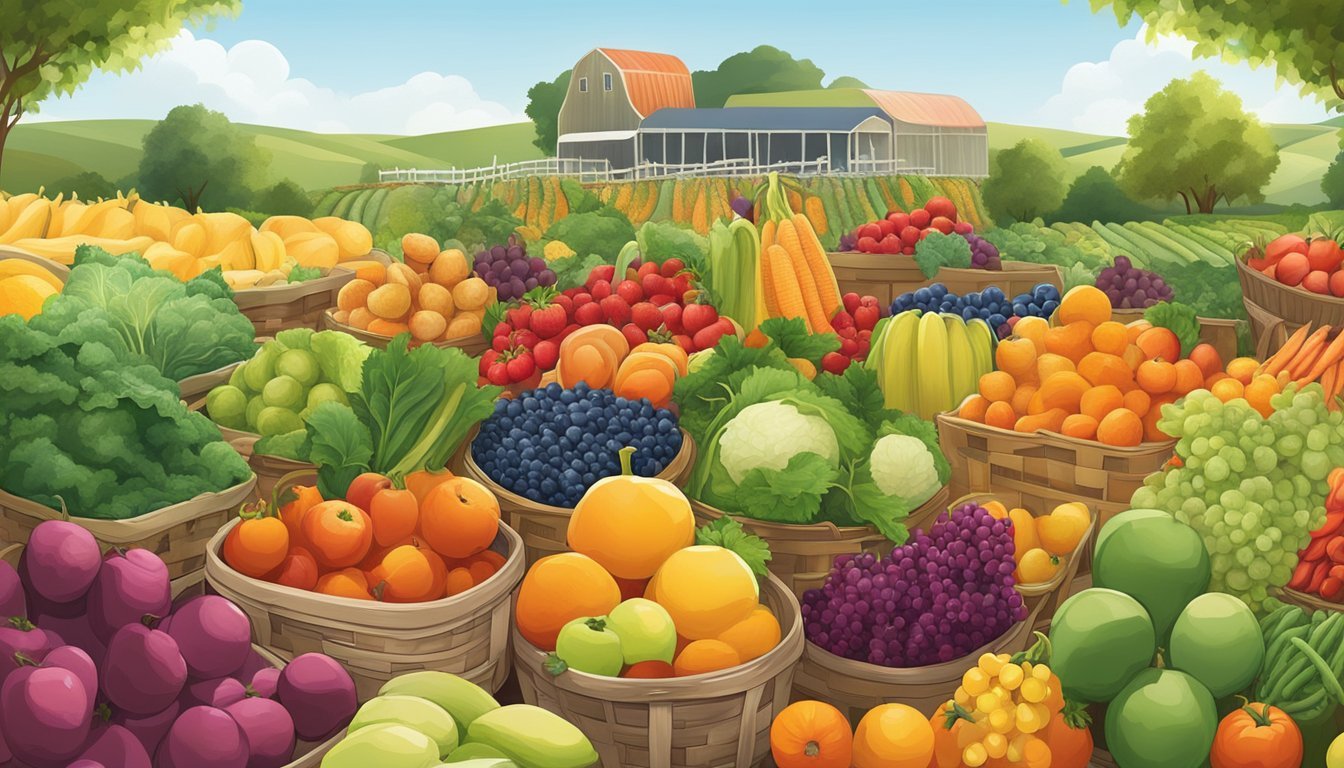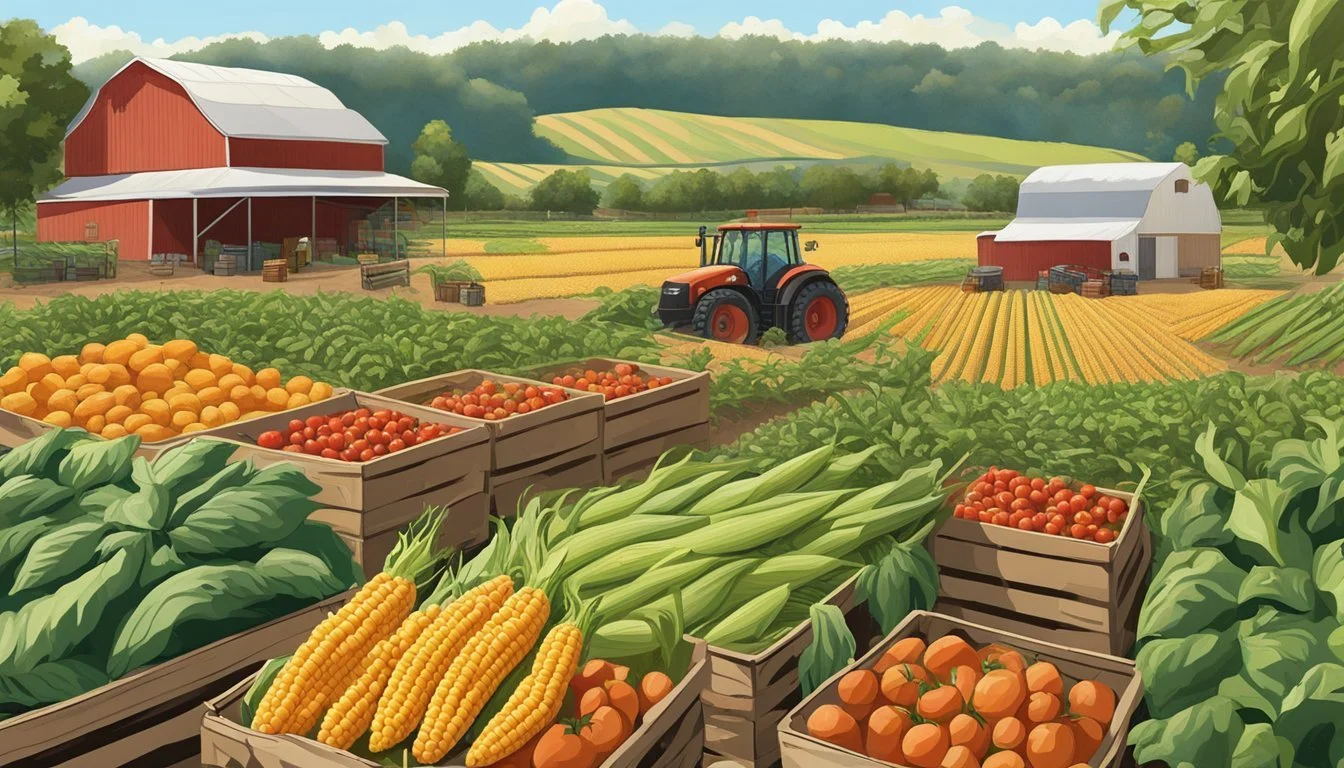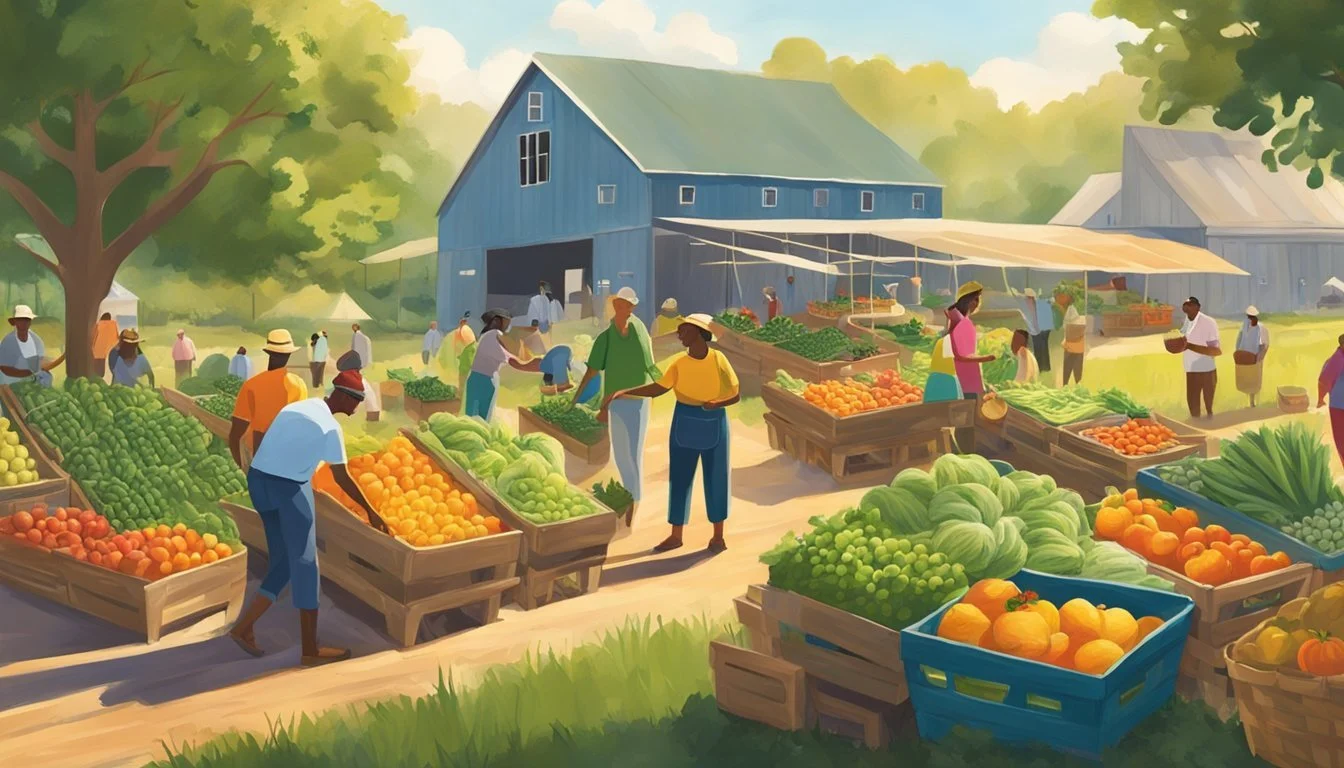Community Supported Agriculture (CSA) in South Carolina
A Guide to Local Farm Partnerships
Community Supported Agriculture (CSA) has taken root in South Carolina as a sustainable model that benefits both local farmers and consumers. Through a CSA, consumers in South Carolina can purchase "shares" of a farmer's harvest, receiving regular deliveries of fresh, seasonal produce. This model fosters a closer connection between people and the source of their food, supporting the local economy and promoting sustainable farming practices. It’s a forward-thinking approach to agriculture that embraces community involvement and ensures the viability of local farms.
The role of CSAs in South Carolina's agricultural landscape has grown significantly, mirroring a national trend towards localized food systems. Consumers are drawn to the transparency and traceability of their food supply. Farmers in turn, are provided with a more predictable income stream and can focus on quality and sustainable methods without the undue pressure of market swings. CSAs in this state vary, offering not only vegetables but also other farm products such as fruits, meats, cheeses, and flowers, widening the reach of local produce.
This agricultural model thrives in diverse settings across South Carolina, from the hardwood stands of the midlands to the fertile fields in Beaufort County. Organic options are also available, with farms like Wild Hope Farm offering USDA Certified Organic produce. Beyond the food itself, many CSA farms in South Carolina host farm-to-table events, further deepening the community's connection to their food and local agriculture. Through participation in CSA programs, South Carolinians are investing in their health, their economy, and their environment.
Understanding CSA
Community Supported Agriculture (CSA) represents a partnership between local farms and community members who subscribe to shares of the farms' output, fostering a direct connection between producer and consumer.
Origins of CSA
The concept of CSA began in the 1960s in Germany, Switzerland, and Japan as a response to concerns about food safety and the urbanization of agricultural land. It reached the United States in the 1980s and has since seen a rise in popularity. In South Carolina, CSA programs have been embraced as a method to support local farmers while providing members with fresh, organic, and seasonal produce throughout the growing season.
CSA Model Mechanics
The mechanics of a CSA are straightforward: consumers become members of a CSA by purchasing a subscription, or "share," from a local farm. In return, they receive a portion of the farm's harvest during the active growing season.
Purchase of Shares: Members typically pay for their share at the beginning of the season, which provides the farmer with the capital needed to plan and plant crops.
Seasonal Harvest: Share distribution is usually on a weekly or bi-weekly basis and includes a variety of the farm's current yield, highlighting seasonal and often organic produce.
LocalHarvest: This organization, along with others, plays a role in connecting consumers with CSA options in their area, making it easier to find and invest in local agriculture.
By investing in a CSA, members commit to sharing in the risks and benefits of food production, often resulting in a deeper appreciation for the effort involved in sustainable agriculture.
Benefits of CSA
Community Supported Agriculture offers a symbiotic relationship between consumers and farmers, where the rewards of fresh, healthy, and local food are distributed in a community-centric way. This system not only fosters a stronger community but also embodies the concept of shared risk and rewards in agriculture.
Advantages for Consumers
Consumers benefit from CSA in several specific ways. They receive a steady supply of fresh and healthy produce, often surpassing what might be available at a local farmers market. This direct partnership with farmers assures them of the local origins of their food, contributing to a healthier diet. By participating in a CSA, members build a personal relationship with the farmer who grows their food, further enhancing their connection to the land and the community.
Freshness: Guaranteed access to fresh produce picked at the peak of ripeness.
Health: A diet enriched with a variety of healthy, typically organic, vegetables and fruits.
Community Connection: Being part of a supportive community that values sustainable agriculture.
Advantages for Farmers
Farmers, on the other hand, gain a reliable market for their produce through CSA. They can plan more efficiently, knowing they have a pre-established customer base, which significantly reduces marketing efforts and costs. This prepayment model provides financial security and allows farmers to focus on quality crop production. Additionally, farmers enjoy the relationship building aspect of CSAs, which strengthens their bond with consumers and the community. The shared risk aspect means farmers are not alone in facing the uncertainties of agriculture; members are co-investors in the farm's bounty and challenges.
Financial Security: Upfront payment for CSA shares helps with the farm's cash flow and planning.
Reduced Marketing: Less time and money spent on marketing enables a focus on farming.
Community Engagement: Direct engagement with consumers fosters a sense of community and feedback on produce.
How CSAs Work in South Carolina
Community Supported Agriculture (CSA) in South Carolina operates through a symbiotic relationship between farmers and community members. Here, local farmers offer shares of their crop yield in exchange for upfront payments, ensuring consistent cash flow for the farm while providing members with seasonal produce.
Local CSA Operations
In South Carolina, CSA operations typically involve small-scale, family-run farms that deliver a box of vegetables or other farm products to their shareholders regularly throughout the farming season. Farms such as Round River Farms exemplify this system, endorsing biodiversity through their organic practices and offering shares that feature a variety of seasonal produce.
Payment and Cash Flow
Upfront payments are fundamental to the CSA model, providing farmers with necessary cash flow to manage their farms' operations. Members typically purchase shares before the planting season, which aids in covering the initial costs of seeds, equipment, and labor. In this way, the CSA model directly ties the community to the agricultural market, instilling a mutual stake in the success of the venture.
Membership and Subscription Details
Membership in a South Carolina CSA requires individuals to subscribe, often for a season, to receive the produce offered. The subscription details, including start and end dates, quantity of produce, and pickup locations, are usually outlined at the beginning of the season. This partnership promotes a deeper understanding and appreciation within the community for the seasonal aspects of farming, as shareholders become directly connected to the rhythm of the growing season.
By understanding the specifics of how CSAs operate within South Carolina, consumers are equipped to make informed decisions about supporting local agriculture and immerse themselves in a community-oriented food experience.
Popular Crops and Products Offered
Community Supported Agriculture (CSA) in South Carolina offers a diverse range of crops and products, directly reflecting the state's rich agricultural heritage and seasonal variety.
Vegetables and Fruits
Vegetables: Members of CSAs in South Carolina can expect an assortment of seasonal vegetables throughout the year. Spring typically kicks off with offerings like asparagus and eagerly awaited strawberries. As the seasons progress, CSA subscribers may receive a wide variety of produce including tomatoes, squash, cucumbers, bell peppers, and greens such as kale and spinach.
Fruits: While vegetables feature prominently in CSA shares, seasonal fruits are also common. Apart from strawberries, other fruits like peaches, apples, and blueberries are staple offerings. Many farms cultivate these fruits between late spring and fall.
Livestock and Dairy
Meat: Farm-fresh meat is a valuable component of some CSA programs in South Carolina. Options may range from beef, pork, to chicken, with most animals being raised in free-range or pasture-fed environments to ensure high-quality produce.
Dairy: Dairy products featured in CSA shares might include milk, cheese, and yogurt. These are typically sourced from local dairies where cows or goats are raised for their milk, and these offerings are prized for their freshness and creamy taste.
Specialty Products
Eggs: Freshly laid eggs from chickens that roam freely in pastures are a common offering. They are appreciated for their rich taste and superior nutritional quality compared to store-bought alternatives.
Flowers: Some CSAs also include the option for flower shares, where members receive bouquets of fresh, locally grown flowers at various times in the growing season.
Organic Farms: For those interested in organic produce, several CSAs deliver goods from certified organic farms where crops and products are grown without synthetic pesticides or fertilizers.
Specialty Crops: Occasionally, CSA shares are enriched with unique specialty items like herbs, honey, or jams. These products often underscore the artisanal aspect of CSA and are made from ingredients grown or sourced from the farm itself.
Organic Farming and Sustainability
Community Supported Agriculture in South Carolina integrates organic practices and environmental sustainability through responsible farming methods and local produce systems.
Organic Practices
Organic farming in South Carolina is guided by the USDA's standards, ensuring that farmers avoid the use of synthetic fertilizers and pesticides. They focus on maintaining and replenishing soil health through the use of natural compost and cover crops. Local farms, like Wild Hope Farm, implement crop rotation and integrated pest management to enhance biodiversity and minimize impact on the surrounding ecosystems.
Soil Health: Maintenance using natural compost and avoidance of synthetic chemicals.
Biodiversity: Promotion by crop rotation and natural pest control methods.
Environmental Impact
The environmental impact of CSA farms practicing organic agriculture in South Carolina is largely positive, promoting sustainability within the agricultural sector. Farms strive to reduce the carbon footprint by minimizing transportation of produce, thus supporting the local community with fresh options while also conserving energy.
Local Produce: Reduces transportation needs and associated emissions.
Sustainable Practices: Ensures long-term health of the land through careful stewardship.
CSA Farms in South Carolina
In South Carolina, community supported agriculture (CSA) offers residents the opportunity to enjoy fresh, local produce while supporting sustainable farming practices. Several farms provide CSA programs, where consumers can purchase a share of the season's harvest and often receive weekly boxes of locally-grown fruits and vegetables. Among these are Gruber Farm, Wild Hope Farm, Legare Farms, and Vital Mission Farm, each contributing uniquely to the state's agricultural offerings.
Gruber Farm
Located just south of St. George, Gruber Farm has a rich heritage of growing natural produce since 1948. The family-owned farm is known for its commitment to quality and community, offering CSA shares that often include a wide array of produce.
Wild Hope Farm
Wild Hope Farm is situated in the rolling hills of Chester, South Carolina. Their focus on organic farming techniques and soil health translates into nutrient-dense crops, which are distributed to CSA members throughout the region.
Legare Farms
On the outskirts of North Charleston, Legare Farms stands as a testament to South Carolina’s agritourism. As one of the state's oldest working farms, they offer CSA boxes that showcase the seasonal variety and heritage of Lowcountry farming.
Vital Mission Farm
Nestled in the serene surroundings of Summerville, Vital Mission Farm operates with a focus on regenerative agriculture. Their CSA program is designed to bring the freshest, most sustainably raised produce to your table, deepening the connection between the farm and the local community.
Each farm not only strengthens the local food system but also serves as an integral part of South Carolina's vibrant agricultural community, connecting Beaufort, Blythewood, North Charleston, and beyond.
Community Engagement and Education
Community Supported Agriculture programs in South Carolina are not just about providing fresh produce to members; they also play a pivotal role in fostering community ties and education. Through farm visits and events, as well as cooking and nutrition workshops, CSA farms engage members in direct and meaningful ways.
Farm Visits and Events
CSA farms often encourage their members to visit the farm, offering them a tangible connection to where their food comes from. These events may include:
Harvest days: Members assist with the harvest, learning about the crops and farm operations.
Seasonal festivals: Celebrations that mark phases of the agricultural calendar, inviting families for a day of activities and learning.
Kids' programs: Interactive tours and games designed to educate children about agriculture and healthy eating.
Cooking and Nutrition Education
Education extends beyond the farm to the kitchen, where CSA members:
Learn new recipes: Cooking classes focus on how to incorporate new vegetables into daily meals.
Gain nutritional insights: Sessions highlight the benefits of eating seasonally and the nutritional content of fresh produce.
Connect with food experts: Dietitians and chefs often collaborate with CSAs to provide members with expert advice and cooking demonstrations tailored to the CSA offerings.
Challenges and Considerations
Community Supported Agriculture (CSA) in South Carolina faces unique challenges that both farmers and consumers must consider. These include the management of risks and expectations, as well as navigating market competition and subscription pricing.
Managing Risks and Expectations
In a CSA model, the shared risk between consumers and farmers is paramount. Consumers subscribe to the harvest of the season, accepting that fluctuations in production due to weather or pests impact what they receive. Farmers, on the other hand, must communicate effectively to set realistic expectations. Ensuring that consumers understand the possibility of a variable yield is essential in maintaining a positive relationship and continued subscriptions.
Key Considerations for Managing Risks and Expectations:
Communication: Regular updates on crop status and any potential impacts on the harvest.
Diversity of Crops: Planting a variety of produce to mitigate the risk of total loss from a single crop failure.
Market Competition and Pricing
CSAs in South Carolina operate within a broader market of commercial transactions for agricultural products. They face competition from grocery stores, farmers' markets, and other food supply chains. To remain competitive, CSA pricing must reflect not only the cost of sustainable farming practices but also the value of the direct-to-consumer relationship.
Key Considerations for Market Competition and Pricing:
Subscription Value: Set subscription costs that represent both the value of fresh, local produce and the overall experience of being a CSA member.
Market Research: Conduct regular assessments of local market prices to ensure CSA shares are priced competitively.
Table 1: Comparative Pricing Structure
Market Outlet CSA Share (Average Price) Farmers' Market (Average Price) Grocery Store (Average Price) Vegetables and Fruits $30 per week $35 per week $25 per week Meats and Specialty Products Not Applicable $45 per week $50 per week
Note: The prices in the table are hypothetical and for illustrative purposes onlysns.
Marketing Strategies for CSA
Effective marketing strategies are essential for Community Supported Agriculture in South Carolina, leveraging both digital and local community engagement to enhance visibility and sales.
Online Presence and Social Media
An online presence is indispensable for CSA businesses. It serves as a digital storefront where potential customers can learn about available shares, farming practices, and pickup locations. A well-designed website should include a clear listing of CSA share options and prices. It's also the prime platform for LLC information, portraying the business as a legitimate and structured entity.
Social media channels are powerful marketing tools that allow farmers to connect with their community, share stories, and update members on seasonal offerings. Platforms such as Facebook, Instagram, and Twitter can be used to:
Post engaging content such as photos and videos of farm activities and harvests.
Share testimonials from satisfied CSA members.
Organize and promote events, which boosts word-of-mouth referrals.
Partnerships and Local Markets
Collaborating with farmers' market managers and other local businesses can widen the reach of CSA programs. Distribution partnerships create convenient pickup points for members at local markets and increase the farm's visibility among market-goers who may not yet be CSA members.
By marketing through local markets, CSAs can demonstrate their product firsthand, creating an opportunity to convert market shoppers into CSA members. Additionally, forming alliances with local food cooperatives and restaurants that prioritize locally-sourced ingredients can result in mutual promotion and increased recognition within the community.
Joining a CSA in South Carolina
For South Carolinians looking to support local agriculture and receive regular supplies of fresh produce, joining a Community Supported Agriculture (CSA) program can be a fulfilling choice. They allow community members to form a direct partnership with local farms.
How to Find a Local CSA
To locate a CSA in South Carolina, one effective resource is LocalHarvest, which maintains a comprehensive nationwide directory of CSAs. Simply enter a South Carolina ZIP code to find nearby CSA options.
LocalHarvest: Offers a searchable database of CSA programs across the state.
South Carolina Department of Agriculture: Lists community-based markets and CSA programs.
Potential CSA members can also visit local farmers markets to inquire about CSAs, as farmers often promote their programs there.
Evaluating Options and Making a Choice
When choosing a CSA, consumers should consider the following specific factors to ensure it meets their needs:
Type of Produce: Many CSAs offer a diverse range of vegetables, fruits, and sometimes additional farm products like eggs and dairy.
Pick-up Locations: Determine if the farm has convenient pick-up points or if they offer delivery services.
Share Size: Evaluate the quantity of food provided in a regular share to ensure it aligns with one’s needs. Some farms offer different share sizes or customizable options.
Community Involvement: Some CSAs may require or offer opportunities for members to volunteer on the farm or at distribution sites.
After evaluating options, members can join by signing up through the farm's website or contact point, often provided in the CSA’s LocalHarvest listing or directly at a farmers market stand.











